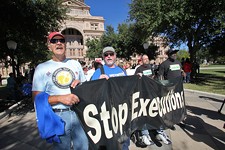Anthony Graves Update: Defense Team Shot Down Again
Judge rules special prosecutor may use recanted – and likely perjured – testimony of man who fingered Graves as his accomplice in multiple murder
By Jordan Smith, Fri., July 20, 2007
On July 12, Towslee-Corbett denied a motion by Graves' defense team, ruling that special prosecutor Patrick Batchelor may use the recanted – and likely perjured – testimony of Robert Carter, who fingered Graves as his accomplice in the 1992 multiple murder of Bobbie Joyce Davis, her daughter, and four grandchildren in Somerville. Carter, who was convicted of the crime, later recanted, saying Graves was not involved in the grisly murders – a recantation he repeatedly reiterated, including in his final statement before being executed in 2000.
"Anthony Graves had nothing to do with it," said Carter from the Texas death chamber. "I lied on him in court."
And although the veracity of Carter's trial testimony, implicating Graves in the crime, was at the heart of the 5th Circuit's decision to overturn Graves' conviction and death sentence last year, Towslee-Corbett last week ruled – without any explanation – that she will allow the state to use a transcript of the dead man's questionable testimony as evidence in Graves' upcoming retrial. (Although originally scheduled to begin Aug. 10, Graves' new trial has been postponed until sometime this fall.)
Towslee-Corbett's decision stunned Graves' defense team – the ruling is "just clearly erroneous, and we don't know how she reached this decision," says David Mullin, one of three attorneys working to finally exonerate Graves. Mullin is flummoxed: He doesn't understand how the 5th Circuit could rule that Carter had "given perjured testimony, and then [Towslee-Corbett] says, 'Oh, yes, we'll let that [testimony] back in,'" Mullin muses.
In overturning Graves' conviction, the federal appeals court found, in part, that the night before Carter testified against Graves, Carter told prosecutors he'd acted alone and that Graves was innocent. The state failed to provide that information to Graves' defense and instead threatened to prosecute Carter's wife as a party to the murders. Allowing the transcript of Carter's questionable testimony to be used in Graves' retrial is akin to declaring the 5th Circuit's decision was wrong, Mullin said.
Additionally, Towslee-Corbett's bizarre decision directly contradicts the U.S. Supreme Court's 2004 ruling (in a case styled Crawford v. Washington), written by conservative Justice Scalia, reaffirming that the direct confrontation of witnesses is the only way to satisfy the Sixth Amendment. Scalia's opinion in that case tossed out a patchwork of exceptions that allowed prosecutors to legally introduce as evidence at trial the testimony of witnesses that, for one reason or another, are not available to testify – like, say, when the "witness" is dead, as is the case with Carter – thus allowing their "testimony" to remain unchallenged by the defense. (The Supremes' Crawford decision was also the basis for the appellate courts' overturning the convictions of Robert Springsteen and Michael Scott, who were charged with murder in connection with Austin's infamous 1991 yogurt-shop slayings.) "I don't know" what Towslee-Corbett was thinking, Mullin says, and "there is no decent explanation for what she did."
At press time, a change-of-venue motion filed by Graves' attorneys was still pending – given Towslee-Corbett's rulings to date (including the imposition of a gag order that was more like a death grip stranglehold on Graves and his defenders and which was ultimately tossed out by the Waco appeals court), it seems unlikely she'll grant the request.
Graves' case is scheduled for a pretrial hearing on July 31 in Caldwell Co.
Got something to say on the subject? Send a letter to the editor.










